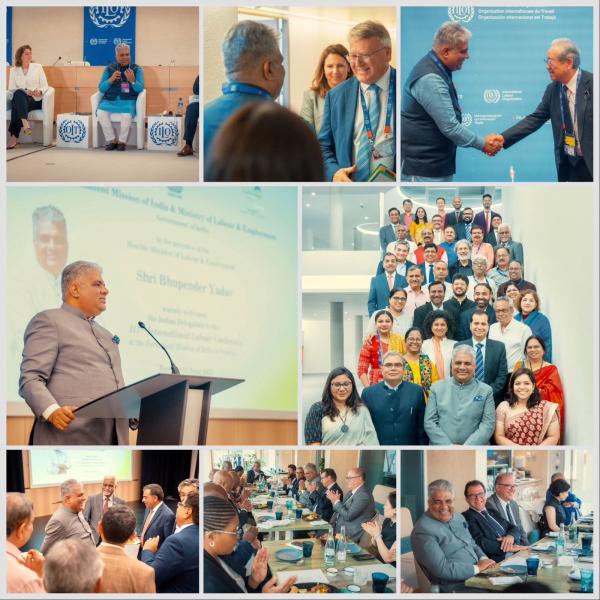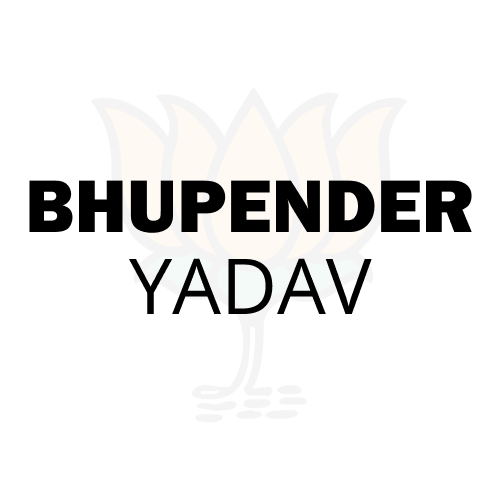
International Labour Conference Diary: World looking for ways to address inequalities
14/06/2023
BLOG
On Day 2 of my engagements at the 111th International Labour Conference of the International Labour Organisation, I participated in a panel discussion of the World of Work Summit. The discussion was organised on the topic, ‘Addressing Inequalities, Informality and Facilitating Inclusion’.
Under the dynamic leadership of Hon’ble Prime Minister Shri Narendra Modi ji, Indian governance is focused on the principle of Sabka Saath Sabka Vikas. Addressing inequalities is thus the front and centre of our policy framework.
My fellow panellists shared that despite global efforts progress towards achieving Sustainable Development Goals has been slow and uneven. The Covid-19 pandemic, the rising cost of living, and environmental change have exacerbated poverty, inequality, and social fractures in many countries. A call was made for urgent action for steps that will enable the world to face these challenges.
Participating in the discussion, I highlighted that India has been working towards addressing inequalities, informality and facilitating inclusion. The first thing I mentioned in my bid to share India’s experiences of dealing with inequality was how we are working towards greater inclusion of women in our workforce.
I mentioned that India has increased paid maternity leave from 12 weeks to 26 weeks, and that the country has made provision for mandatory crèche facility in the establishments having 50 or more employees. India has also ensured women, should they so want to, be allowed to work in night shifts with adequate safety measures.
The steps are aimed at increasing women’s participation in the workforce and ensure they do not quit due to an unfair burden of family responsibilities falling on their shoulders. Women have now been empowered for employment in all establishments covering all types of works.
The effort isn’t just to get women into the workforce but to also ensure they are rewarded at par with men for the work they do. ‘Equal pay for equal work’ envisaged under Article 39(d) of the Constitution is a constitutionally enforceable right. I highlighted how the Modi government is ensuring the law is enforced.
I also discussed ways in which the government is augmenting employment opportunities and training. I was happy to share the success of the e-Shram portal, which moving towards providing the foundation of “Amrit Kal for Garib Kalyan”. E-Shram is already available on Umang App and based on the data collected from the portal many schemes and programs can be designed to provide direct benefits to the unorganised workers of India.
The main objective of e-Shram is to facilitate delivery of social security/welfare schemes to the informal workers. This repository is also envisaged to provide portability of the social security/welfare schemes to migrant workers. The eShram portal has been integrated with the employment service portal, skill development portal and pension portal for informal sector workers, which will help such workers to seamlessly take these benefits.
India’s employment service portal, National Career Service portal, provides a variety of services such as job matching, career counselling, vocational guidance etc, to both formal and informal sector workers. As on April 30, 2023, the NCS platform has 31.6 million registered jobseekers, 1.12 million active employers, and mobilised more than 13.5 million vacancies.
It was a matter of pride for me personally to participate in the panel discussion and share India’s experiences. At the same time it was also enriching to hear from other countries about their experiences, successes and challenges in ensuring equity and equality in the world of works.
Prior to this, I participated in a dinner hosted by South Africa for BRICS representatives.
I acknowledged the importance of cooperation among BRICS nations in promoting economic growth and development. I mentioned that the South African Presidency has highlighted the importance of social protection systems which ensures that informal workers have access to basic services and support in times of economic hardship.
I highlighted that it is aligned with our G20 priority areas of social protection for Gig and Platform workers and sustainable financing of social protection being deliberated upon under India’s Presidency.
I mentioned that India supports the proposal put forward by South Africa to establish a joint platform for BRICS Productivity Ecosystems in the context of the Strategy for BRICS Economic Partnership 2025.
India, under Hon’ble PM Modi, attaches importance to its engagement with BRICS which has emerged as a valuable forum for dialogue and collaboration to tackle common labour market challenges through consultation, cooperation and mutual understanding.
Apart from the World of Work Summit and the BRICS dinner, I also had the opportunity to hold a tripartite meeting of employees and employer associations in Geneva, on the sidelines of the Labour Conference.
I heard the concerns shared by both sides and apprised them about how the Hon’ble PM Modi-led government is making efforts for both workers’ welfare and ease of doing business.
I also had the opportunity of meeting Nicholas Schmit, European Commissioner for Jobs and Social Rights; and Hanyuda Takashi, State Minister of Health, Labour and Welfare. Both these bilateral meetings allowed me the opportunity to try and work towards deepening ties and exploring areas where we can further cooperation.
I told Mr Schmit that India-EU cooperation has expanded and intensified significantly in the past few years. This, I said, reflects in frequent and fruitful visits and exchanges at the highest leadership levels between the two sides, including at our Prime Minister’s level.
I stated that currently, the three main pillars of the India-EU relationship are trade, digital partnership and cooperation in green transition. In this regard, free movement of talent and skill between India and the EU, and the development of this area of India-EU ties is of vital importance for all the three pillars.
In my meeting with Mr Hanyuda Takashi, we discussed how the friendship between India and Japan has a long history, rooted in spiritual affinity and strong cultural and civilizational ties.
Hon’ble PM Shri Narendra Modi ji places huge value to relations with Japan. During the visit of Prime Minister Kishida to India, the Indian PM Said, “Strengthening this partnership is not only important for both our countries, it also promotes peace, prosperity and stability in the Indo-Pacific region.”
As a representative of India in Geneva, I told Mr Hanyuda Takashi that at a time Japan is facing an aging and shrinking population, resulting in labor shortage, make the nation's economy dependent on foreign workers, particularly in semi-skilled segment, India’s young, dynamic and skilled manpower provides the perfect opportunity to resolve this issue that Japan is facing.
Both Mr Hanyuda Takashi and Mr Nicholas Schmit were warm, patient and appreciative of India’s efforts in furthering ties.
With another couple of days to go before I wrap up my Geneva visit, I look forward to more such days to further India’s voice on issues of labour and deepening ties for the welfare of workers everywhere.
